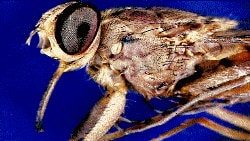A special genetic screening technique is shedding new light on why drug treatment often is ineffective against a dreaded tropical disease called sleeping sickness. The work could lead to the development of new and better drugs to control this often fatal illness.
African sleeping sickness is caused by a parasite called Trypanosoma brucei that is transmitted by the bite of a tsetse fly. Left untreated, the disease attacks the central nervous system and is often fatal.
Sleeping sickness, or trypanosomiasis, is endemic throughout sub-Saharan Africa. It killed an estimated 48,000 people in 2008. Experts say trypanosomiasis cases are largely underreported, so the death rate could be higher.
There are five drugs used to treat African sleeping sickness, but little is know about how and why they are effective, or how the parasite has managed to develop resistance to the drugs.
An older drug, called melarsoprol, is a highly toxic arsenic-based compound that can cause symptoms of arsenic poisoning - convulsions, fever, loss of consciousness, nausea and vomiting. But because sleeping sickness can be a lethal illness and because some of the other drugs are so expensive and difficult to administer, melarsoprol continues to be used to treat trypanosomiasis patients.
David Horn is a molecular biologist at the London School of Hygiene and Tropical Medicine who led the effort to find the source of the parasite's resistance to existing treatments.
“By understanding resistance, we can actually maybe develop tests for resistant parasites and that can guide the intervention strategies that are used in a particular patient,” Horn said.
The single-celled trypanosome contains 7,000 genes. Researchers used a special technique that switched off each gene individually. That enabled them to find 50 genes that produce proteins associated with the parasite's drug resistance.
Horn says the researchers’ immediate goal was to understand how the protozoan developed that resistance. In time, Horn says, the research could lead to the development of new drugs using the same mechanisms or pathways that render existing African sleeping sickness drugs ineffective.
“If we understand how the current drugs work, we may be able to exploit that information to make new drugs that exploit similar pathways,” Horn said.
An article on drug resistance in the treatment of African sleeping sickness is published in the journal Nature.
Scientists Develop Tool to Unmask Sleeping Sickness Resistance




